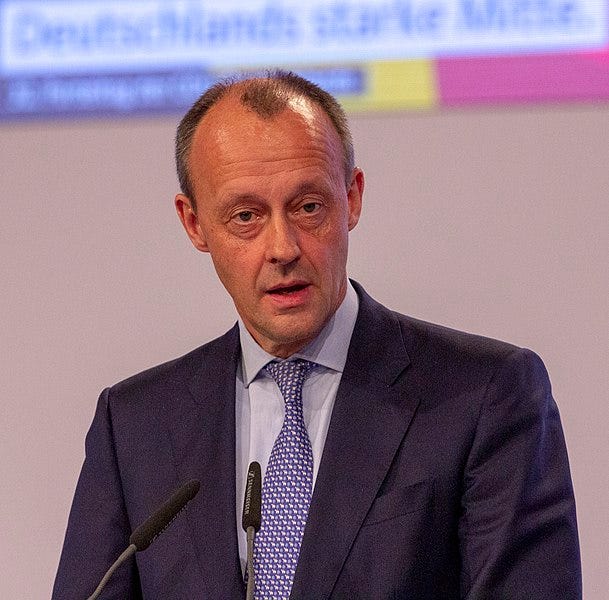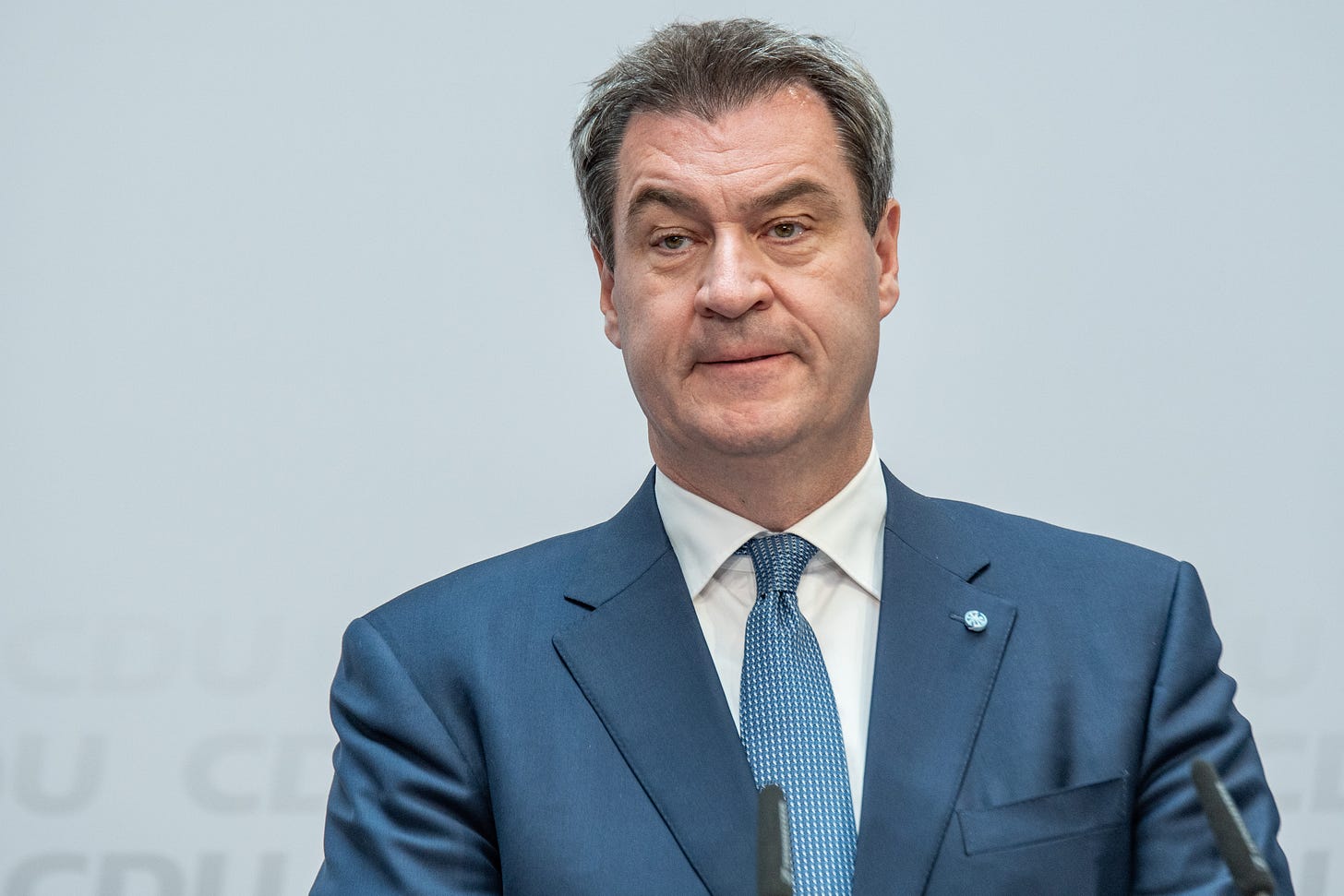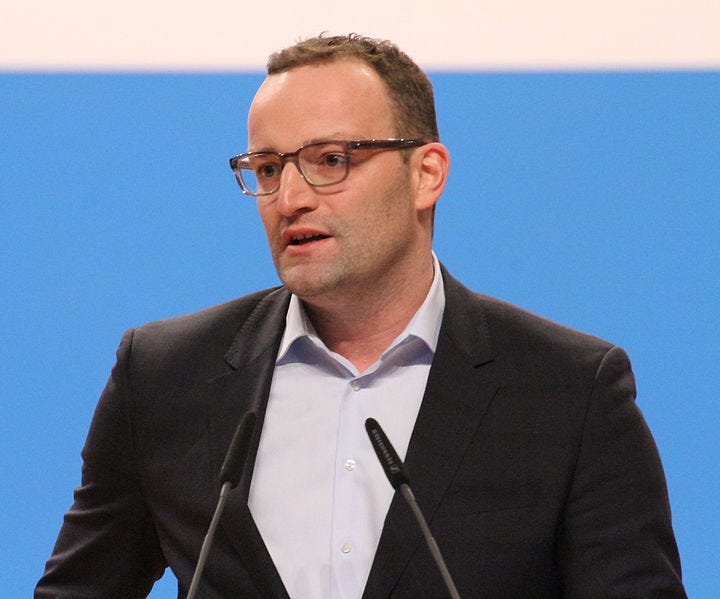The race to replace Mutti Merkel
This is a 5-minute read
In mid-January, the Christian Democratic Party (CDU) will decide on how to elect a new chairman. Under normal circumstances that would happen at a convention but it is improbable that the governing party, which is doing all it can to keep the public from gathering, will organize a get-together for the delegates who vote on their new leader. But the two main contenders, Armin Laschet and Friedrich Merz, have bigger problems than that...
The big picture:
The CDU chairman will in all likelihood succeed Angela Merkel as Bundeskanzler on September 26th, 2021. With polls putting them on 35 percent, the next parliamentary election is the CDU's to lose. It is customary, but not a rule, for the party’s chairman to also be its chancellor candidate.
It’s complicated...
Laschet is a moderate Merkel ally and the party leadership’s favourite. He is also governor of Germany’s largest state, North-Rhine Westphalia. Friedrich Merz is a conservative Merkel critic attempting a political comeback after 15 enriching years in the private sector.
Merz has strong support among the CDU’s rank-and-file, where many wish to turn back the clocks to a time before Merkel abolished nuclear energy, opened the borders and legalized gay marriage. But the party’s management wants to stay in the Mitte and believe that Merz’s erratic and polarizing style will scare voters off.
Making things complicated are two outsiders not in the running for the chairmanship, but who are the voters’ favourite would-be chancellors. Bavaria’s governor Markus Söder and federal Health Minister Jens Spahn are rumoured to be waiting in the wings - should either be asked to run, they would.
Not only do the 1,001 delegates need to decide who to vote for (the establishment candidate, the grass-roots man, or someone who can usher in Söder or Spahn), they need to wait for a decision on how they can vote - in-person is unlikely but for an online vote to happen, Germany’s strict Parteiengesetz needs to change.
The CDU can’t make that happen on their own, they need a Bundestag majority. But why the rush? say all other parties, who have every interest in the leadership battle dragging on into next year. But the CDU doesn’t have time - without a chairman and chancellor candidate they can’t start their election campaign.
The back story:
In the autumn of 2018 the CDU and its Bavarian sister CSU suffered crushing setbacks in local elections. Angela Merkel’s popularity had been on the wane since the refugee crisis and her government - the fourth in a row - was derided as lame and stale. After 13 years in power, Mutti had become a liability.
On the 29th of October 2018, as the CDU was polling at 25 percent, Merkel declared that she would step down as chairwoman and not run in the next election.
Two months later, her protegé, Annegret Kramp-Karrenbauer, succeeded her as chairwoman. In a party that prides itself on unity, the grumbling that Friedrich Merz, who came a close second, would have been a better choice for renewal, was silenced.
Kramp-Karrenbauer never gained momentum and couldn’t turn around the party’s poor polling figures. A failed attempt to solve a government crisis in the state of Thuringia was the last straw. Ahead of a full-on mutiny, she threw in the towel in February of this year.
Friedrich Merz declared his ambition to run again. The Merkel camp rallied around Armin Laschet. A third contender, foreign policy expert Norbert Röttgen, stands zero chance.
The race had not even begun when the Corona pandemic reshuffled the cards:
Angela Merkel’s televised address to the nation on March 18th marked an unlikely comeback in the winter of her long career. Merkel’s stewardship of the pandemic helped her regain popularity. The CDU rose 15 percentage points in the polls in three months. Mutti was back with a vengeance and there was even talk of her taking back her resignation.
During the first weeks of the pandemic, Armin Laschet had the upper hand. As governor of North-Rhine Westphalia, he used the crisis to his advantage and got press coverage for his dovish approach, propagating soft restrictions.
Yet the tactic backfired, the public favoured the hard-hand of Bavarian governor Markus Söder. Mr Söder is not in the running for the chairmanship as he does not belong to the CDU but to the Bavarian sister party CSU, but he is popular far beyond Bavaria. A meticulously orchestrated Merkel-Söder summit in July set the rumour mill spinning - would the CDU make the CSU-man their chancellorship candidate? The CDU has twice previously not been able to agree on a candidate and turned to Bavaria instead. Franz Josef Strauss and Edmund Stoiber both lost their elections in 1979 and 2000.
Like what you’re reading? German current affairs and news straight to your inbox three times a week. Subscribe here to get the Hochhaus newsletter:
Another rumour started to do the rounds. In 2018’s leadership contest, Health Minister Jens Spahn came dead last after Merz and Annegret Kramp-Karrenbauer. In 2020 he positioned himself as Laschet’s number two, rather than running himself. No politician has gained as much in popularity during the pandemic as the 41-year old Spahn. The idea of a switch up, Laschet and Spahn changing places, gained ground.
As he does not hold a public office, the pandemic made it difficult for Friedrich Merz to get his message across, but he used the summer months to lobby the local Landesverbände, from which the voting delegates stem.
“The CDU is staring into the abyss”
Two weeks ago the CDU made a big call - the in-person party convention planned for December 4th, where the chairman (and possibly the chancellor candidate) was to be coronated, was postponed indefinitely.
Merz sent shockwaves through his party when he claimed that the decision was made, not due to the pandemic, but because the ‘establishment’ was trying to steal his victory by giving Laschet time to improve his ratings or by finding a way to usher in either Spahn or Söder as chancellor candidate.
The allegations met with a stern rebuke from chairwoman Kramp-Karrenbauer and several state governors. No one came to his defence. Instead he was called a “conspiracist”, “a narcissistic populist” and even likened to Donald Trump.
In a sign of how unusual Merz’s actions were for a party built on discipline, Kramp-Karrenbauer warned that “the CDU is staring into the abyss” before calming the waters with a compromise - instead of an indefinite postponement of the convention the party would decide on “next steps” in January.
Realizing his tactical blunder, Mr Merz became all mushy and said that “the CDU is like a big family and every now and then you have a little row.”
What to watch:
There will not be an in-person convention anytime soon. Friedrich Merz, who does not want to lose his alleged lead, knows that and is pushing for an online vote ASAP. If the Bundestag does not move on this, the irritable former banker won’t stay quiet for long.
The longer the vote is in limbo, the greater the likelihood that the truce between the candidates will crumble and new rumours about Spahn and Söder will emerge. Can the party of power hold together, or will it tear itself apart in front of rolling cameras?
It is fascinating that Germany’s next chancellor will de-facto be chosen by 1001 CDU delegates and yet there is little indication in which direction they are leaning. The campaign will have soon dragged on for a year - will the country be on its toes until the vote happens?
The bottom line…
…is that the CDU, which has ruled Germany for 50 of the last 70 years, realized too late that there will be a time after Merkel. Similar to the main US parties, the CDU is a broad church, home to liberal urbanites, socially-conservative rurals, as well as worker groups. Merkel has bridged internal divisions only thanks to her smashing successes at the ballots. As she leaves the arena, the divisions will resurface.
The CDU once again needs to clarify what, apart from governing, it really stands for.
A.B.B.
Like what you’re reading? German current affairs and news straight to your inbox three times a week. Subscribe here to get the Hochhaus newsletter:
Who we are:
Jörg Luyken: Journalist based in Berlin since 2014. His work has been published by German and English outlets including der Spiegel, die Welt, the Daily Telegraph and the Times. Formerly in the Middle East.
Axel Bard Bringéus: Started his career as a journalist for the leading Swedish daily Svenska Dagbladet and has spent the last decade in senior roles at Spotify and as a venture capital investor. In Berlin since 2011.






